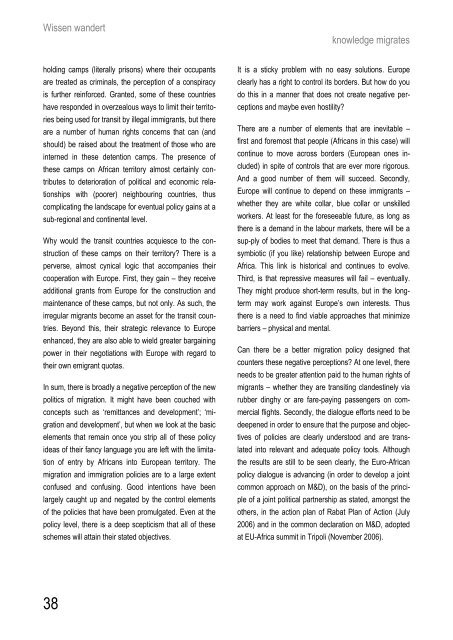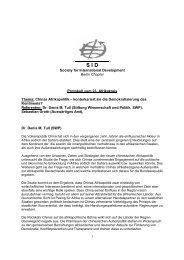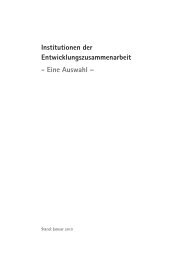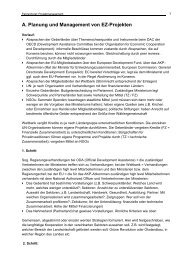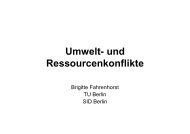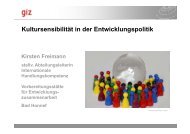Konferenzbericht (PDF-Dokument, 3 MB) - SID
Konferenzbericht (PDF-Dokument, 3 MB) - SID
Konferenzbericht (PDF-Dokument, 3 MB) - SID
Sie wollen auch ein ePaper? Erhöhen Sie die Reichweite Ihrer Titel.
YUMPU macht aus Druck-PDFs automatisch weboptimierte ePaper, die Google liebt.
Wissen wandert<br />
holding camps (literally prisons) where their occupants<br />
are treated as criminals, the perception of a conspiracy<br />
is further reinforced. Granted, some of these countries<br />
have responded in overzealous ways to limit their territo-<br />
ries being used for transit by illegal immigrants, but there<br />
are a number of human rights concerns that can (and<br />
should) be raised about the treatment of those who are<br />
interned in these detention camps. The presence of<br />
these camps on African territory almost certainly con-<br />
tributes to deterioration of political and economic rela-<br />
tionships with (poorer) neighbouring countries, thus<br />
complicating the landscape for eventual policy gains at a<br />
sub-regional and continental level.<br />
Why would the transit countries acquiesce to the con-<br />
struction of these camps on their territory? There is a<br />
perverse, almost cynical logic that accompanies their<br />
cooperation with Europe. First, they gain – they receive<br />
additional grants from Europe for the construction and<br />
maintenance of these camps, but not only. As such, the<br />
irregular migrants become an asset for the transit coun-<br />
tries. Beyond this, their strategic relevance to Europe<br />
enhanced, they are also able to wield greater bargaining<br />
power in their negotiations with Europe with regard to<br />
their own emigrant quotas.<br />
In sum, there is broadly a negative perception of the new<br />
politics of migration. It might have been couched with<br />
concepts such as „remittances and development‟; „mi-<br />
gration and development‟, but when we look at the basic<br />
elements that remain once you strip all of these policy<br />
ideas of their fancy language you are left with the limita-<br />
tion of entry by Africans into European territory. The<br />
migration and immigration policies are to a large extent<br />
confused and confusing. Good intentions have been<br />
largely caught up and negated by the control elements<br />
of the policies that have been promulgated. Even at the<br />
policy level, there is a deep scepticism that all of these<br />
schemes will attain their stated objectives.<br />
38<br />
knowledge migrates<br />
It is a sticky problem with no easy solutions. Europe<br />
clearly has a right to control its borders. But how do you<br />
do this in a manner that does not create negative per-<br />
ceptions and maybe even hostility?<br />
There are a number of elements that are inevitable –<br />
first and foremost that people (Africans in this case) will<br />
continue to move across borders (European ones in-<br />
cluded) in spite of controls that are ever more rigorous.<br />
And a good number of them will succeed. Secondly,<br />
Europe will continue to depend on these immigrants –<br />
whether they are white collar, blue collar or unskilled<br />
workers. At least for the foreseeable future, as long as<br />
there is a demand in the labour markets, there will be a<br />
sup-ply of bodies to meet that demand. There is thus a<br />
symbiotic (if you like) relationship between Europe and<br />
Africa. This link is historical and continues to evolve.<br />
Third, is that repressive measures will fail – eventually.<br />
They might produce short-term results, but in the long-<br />
term may work against Europe‟s own interests. Thus<br />
there is a need to find viable approaches that minimize<br />
barriers – physical and mental.<br />
Can there be a better migration policy designed that<br />
counters these negative perceptions? At one level, there<br />
needs to be greater attention paid to the human rights of<br />
migrants – whether they are transiting clandestinely via<br />
rubber dinghy or are fare-paying passengers on com-<br />
mercial flights. Secondly, the dialogue efforts need to be<br />
deepened in order to ensure that the purpose and objec-<br />
tives of policies are clearly understood and are trans-<br />
lated into relevant and adequate policy tools. Although<br />
the results are still to be seen clearly, the Euro-African<br />
policy dialogue is advancing (in order to develop a joint<br />
common approach on M&D), on the basis of the princi-<br />
ple of a joint political partnership as stated, amongst the<br />
others, in the action plan of Rabat Plan of Action (July<br />
2006) and in the common declaration on M&D, adopted<br />
at EU-Africa summit in Tripoli (November 2006).


